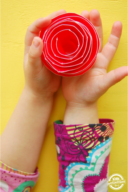Cold and flu season is well underway and pediatricians are warning parents to
watch out for symptoms of RSV as well. In fact, they are warning parents there is a spike in RSV cases. Basically, this year, the cases seem to be hitting harder and faster than usual. Here’s what you need to know.
 What is RSV?
What is RSV?
RSV, or Respiratory Syncytial Virus Infection, may appear as a cold or similar in older children, but can be risky for young babies or people with other health conditions. It typically begins with a runny nose or congestion.
A father from Michigan shared his experience when his son, Mason, developed RSV, after being born healthy near Thanksgiving. Michael Eves, a firefighter, had to call 911 after his son stopped breathing in his arms for several seconds. Baby Mason ended up with a weeklong hospital stay after a diagnosis of RSV.
The bottom line is, it’s scary for young babies and people with health conditions that do not allow them to fight off infections as well as others. In many cases, it can even be lift threatening if not caught in time.

While RSV is common in the winter months, Traverse Area Pediatric and Adolescent Clinic’s Dr. Kristie Koehler says:
“This year, it seems like it’s been a particularly strong virus and it’s hitting kids a little bit harder and a little bit faster than we usually see.” (Source)

The Center for Disease Control offers
tips to prevent the spread of RSV.
For those who are already exhibiting cold-like symptoms, they recommend
- Cover your coughs and sneezes with a tissue or your upper shirt sleeve, not your hands
- Wash your hands often with soap and water for 20 seconds
- Avoid close contact, such as kissing, shaking hands, and sharing cups and eating utensils, with others

Adults with these symptoms should avoid being around young children if possible, along with cleaning contaminated surfaces, such as door knobs, to help prevent the spread of germs.
For parents of young children, the CDC also recommends extra hand washing and avoiding close contact with sick people or group settings when possible.

It’s also a great practice to not touch babies’ hands or faces or kiss them at this time of year, to prevent all illnesses, not just RSV.
These signs also act as a great reminder for people not to touch babies during the cold and flu season.
 What is RSV?
What is RSV? While RSV is common in the winter months, Traverse Area Pediatric and Adolescent Clinic’s Dr. Kristie Koehler says:
While RSV is common in the winter months, Traverse Area Pediatric and Adolescent Clinic’s Dr. Kristie Koehler says:
 The Center for Disease Control offers tips to prevent the spread of RSV.
For those who are already exhibiting cold-like symptoms, they recommend
The Center for Disease Control offers tips to prevent the spread of RSV.
For those who are already exhibiting cold-like symptoms, they recommend
 Adults with these symptoms should avoid being around young children if possible, along with cleaning contaminated surfaces, such as door knobs, to help prevent the spread of germs.
For parents of young children, the CDC also recommends extra hand washing and avoiding close contact with sick people or group settings when possible.
Adults with these symptoms should avoid being around young children if possible, along with cleaning contaminated surfaces, such as door knobs, to help prevent the spread of germs.
For parents of young children, the CDC also recommends extra hand washing and avoiding close contact with sick people or group settings when possible.
 It’s also a great practice to not touch babies’ hands or faces or kiss them at this time of year, to prevent all illnesses, not just RSV. These signs also act as a great reminder for people not to touch babies during the cold and flu season.
It’s also a great practice to not touch babies’ hands or faces or kiss them at this time of year, to prevent all illnesses, not just RSV. These signs also act as a great reminder for people not to touch babies during the cold and flu season.




















0